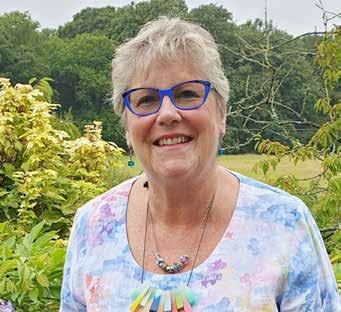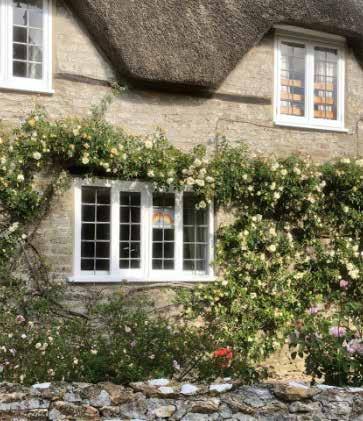
8 minute read
OTHER NEWS
CITIZENS ADVICE NOTES
Citizens Advice in Sherborne is currently operating a phone only service with advisers working from home.
Advertisement
The contact number is: 0344 411 1444 (charged at local rate).
The Coronavirus emergency has presented opportunities for scammers to try and take advantage, so it is timely that June is ‘Scams Awareness Month’ with specific events planned for 15 – 28 June. For more information google ‘citizens advice scams awareness month 2020’ and look for the section on ‘Advice for consumers’.
You could also look at www. citizensadvice.org.uk/consumer/ scams/get-help-with-online-scams for information about on-line scams: there is also a helpline, 0808 2505050, where you can talk to a Scams Action Adviser.
Beware of scams which are reported to be doing the rounds:
Free school meals scam – some parents have received an email asking them to ‘send their bank details to make sure they are supported’. Ignore the email and report it as spam.
Home testing scam – see www.actionfraud. police.uk/news/ctsiissues-warning-overcovid-19-home-testingscams for advice about suspicious callers doorto-door offering Covid-19 testing.
Coronavirus and life in lockdown
Our volunteers have been working hard to ensure to help those residents who need support with collecting medicines or shopping etc. and it is reassuring to know that we have been making a difference.
There is a new contact number for the help line if you need assistance during the present restrictions and you are now asked to ring 01395 221022 which is the central number for support in Dorset although you can still leave requests and messages at yetvirushelp@gmail.com and these will be passed on. The help line is open 8am to 8pm, 7 days a week and they have access to a large number of helpers throughout the County.
Yetminster Help Group
Coronavirus – what to do if you have symptoms
Anyone with symptoms of coronavirus – a new continuous cough OR a high fever OR a loss or change of taste or smell – should self-isolate immediately and not leave home. Other members of your household must also self-isolate.
You should ask for a test as soon as you have any of these symptoms. You can ask for a test online or call 119 if you have no internet access.
NHS Test and Trace
The NHS test and trace service ensures that: –anyone who develops symptoms of coronavirus (COVID-19) can quickly be tested to find out if they have the virus –helps trace close recent contacts of anyone who tests positive for coronavirus and, if necessary, notifies them that they must self-isolate at home to help stop the spread of the virus
How NHS Test and Trace will contact you
If you’re identified as a close contact of a confirmed case, NHS Test and Trace will contact you by email, text or phone. Text messages will come from the NHS. Calls will come from 0300 0135000. Children under 18 will be contacted by phone wherever possible and asked for their parent or guardian’s permission to continue the call.
You’ll be asked to sign in to the NHS Test and Trace contact tracing website at https://contact-tracing.phe.gov.uk. If you cannot use the contact tracing website, they will call you.
Be aware of scams
The NHS Test and Trace service will not ask for bank details or payments or for details of any other accounts, such as social media. Nor will it ask you to set up a password or PIN number over the phone, or to call a premium rate number, such as those starting 09 or 087.
Naomi Mason /Health Programme Advisor
A Message of thanks
I just wanted to say thank you to the nearly 7000 volunteers that we’ve got across Dorset currently helping people with everyday things – like prescription collection, shopping, dog walking, a bit of gardening and giving lifts – but really too many things to mention.
You are all incredible. We and our partners across Health, across communities and across the voluntary sector realise that we couldn’t do the things that have been done without this army of volunteers who have just stood up and been incredible.
It may seem like small things that you do but they mean a huge deal to those you are helping and collectively its meant that we can get through this crisis together.
So, on behalf of Dorset Council and all our partners we are grateful to you and we love you.
Thank you.
Cllr Laura Miller Dorset Council Portfolio Holder for Adult Social Care and Health

Appreciating what we have around us
Thanks to John Sanford who found this poem to sum up what he – and perhaps many people – feel about lockdown, and how to appreciate the value of nature and our surroundings. The identity of the author remains a mystery – does anyone know who it is?
Joys that are free
It doesn’t cost money as many suppose To have ‘a good time’ on the earth The best of its pleasures are free unto those Who know how to value their worth
The sweetest of music the birds to us sing The loveliest flowers grow wild The finest of drinks gushes out o’ the spring All free to man women and child
Kind words and glad looks and smiles cheery and brave Cost nothing – no nothing at all And yet all the wealth that a kingdom could save Can make no such pleasures befall
No money can purchase, no artist can paint Such pictures as nature supplies For ever all over to sinner and saint Who use to advantage their eyes
To bask in the sunshine, to breathe the pure air, Honest toil, the enjoyment of health, Sweet slumber refreshing – these pleasures we share Without any portion of wealth

Communion with friends who are tried, true and strong To love and be loved for love’s sake In fact, all that makes a life happy and long Are free to whoever will take.

So ... the swallows are still in the workshop, there is a song thrush in the hawthorn hedge at the end of the orchard, a nuthatch in the hedge by the lean-to shelter, a wren under the decking and robins in the hazel coppice. A large family of magpies practice their Morris dancing on the cabin roof at any time when we might want to just sit and enjoy a bit of quiet reading! We don’t usually notice so many things, but then we don’t usually sit about drinking tea quite so much!
It is hard, writing this in June, to guess how things will be by August, or even July, or even by the end of June! So this is my best guess.........
We have decided that we will go ahead with our planning for a Celebratory Stroll on Saturday 11 July. The idea is that people come and wander round and enjoy the beauty of the woodland, get some exercise, see what we have been doing, and maybe have a picnic. We don’t know what the situation will be regarding social distancing by then so we are assuming it will be the same as now. Please let us know if you want to come and let us know what time so we can spread visits out throughout the day. You are welcome to picnic but please bring your own and stay in family groups. Keep an eye on our Facebook page for more up to date information.

Holiday Club
We are planning to start holiday club on Monday 13 July. As usual we will start at 10.00am and finish at 3.00pm (half days are available) on Mondays, Tuesdays, Thursdays and Fridays each week until the end of August. As things are at the moment, we plan to restrict numbers to six children per day so it is vital that places keeping the price at £15 per day.
Wild School Week
This will be from Monday 24 to Friday 28 August (excluding Wednesday).
Going back to school will be a huge change for those who have been having school at home since March. As well as all our normal activities we plan to do lots of outdoor Pogles Wood reading room learning and preparing for the excitement of whatever school has to offer in September. You will be amazed at how much maths and science there is in building a den or making bread, constructing a sundial or designing a paper airplane!
Can’t wait to see you.
Philippa Toulson
For more info contact: philippa.toulson@gmail.com or Facebook Pogles Wood Explorers
Throughout the summer months butterflies will be actively searching for nectar and suitable foodplants on which to lay their eggs in gardens, grassy places, woodland and hedgerows, where wild and cultivated plants will provide food for caterpillars. Nettles are very important as larval foodplants for the caterpillars of Red Admiral, Small Tortoiseshell, Comma and Peacock butterflies.
Other species such as Speckled Wood, Gatekeeper and Ringlet feed on various grasses. Brimstone caterpillars feed on Buckthorn, whilst caterpillars of others featured here may be found on a wide variety of plants. The Painted Lady butterfly is a migrant species from the Mediterranean area, great numbers arriving on our shores in some years.

q
Of around sixty species found in the UK, you are very likely to see the twelve which were photographed in this Leigh garden.
How many will you see this summer, and can you spot the Orange-tip butterfly so cleverly camouflaged among Cow Parsley flowers?
Gill Nash
Answers on p.62


w
e


r

u

o


s i


a












